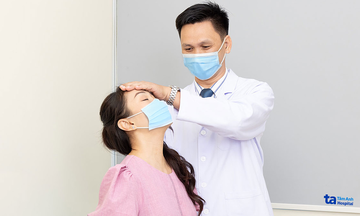Doctor Dao Thi Yen Thuy, Head of the Nutrition and Dietetics Department at Tam Anh General Hospital in Ho Chi Minh City, explains that egg yolks are packed with lutein and zeaxanthin, two pigments concentrated in the macula of the retina. These pigments filter harmful blue light, reducing retinal cell damage and the risk of vision loss.
Consuming lutein and zeaxanthin from eggs can also slow the progression of age-related macular degeneration, a leading cause of vision impairment in older adults. The antioxidants in eggs also help limit lens oxidation, reducing the risk of cataracts.
 |
Adults should eat eggs 3-4 times a week. Photo: Bui Thuy |
Adults should eat eggs 3-4 times a week. Photo: Bui Thuy
Eggs are rich in vitamin A, an essential nutrient for the cornea and eye mucous membranes, which helps reduce dry eyes. The vitamin E, zinc, and selenium content in eggs also play an antioxidant role, strengthening the eyes' defense against UV rays and environmental pollution. The lutein and zeaxanthin in eggs are more easily absorbed than those from vegetables due to the natural fats in the yolk.
Doctor Yen Thuy recommends that adults consume 3-5 eggs per week. Older adults or those at risk of eye diseases should aim for one egg daily, combined with dark green vegetables for enhanced vision protection. Supplementing with natural extracts from broccoli, which increase thioredoxin (a small protein that acts as a reducing antioxidant), can help protect retinal pigment epithelial cells, thereby improving eyesight. Individuals with lipid disorders or cardiovascular conditions should consult their doctor for a suitable diet.
 |
Doctor Yen Thuy provides nutritional advice to patients. Photo: Tam Anh General Hospital |
Doctor Yen Thuy provides nutritional advice to patients. Photo: Tam Anh General Hospital
Beyond diet, for long-term vision protection, individuals should limit exposure to blue light from phones, computers, and televisions. Following the 20-20-20 rule (looking at something 20 feet away for 20 seconds every 20 minutes of screen time) can reduce eye strain. Wearing sunglasses outdoors limits UV exposure, and sufficient, quality sleep also plays a role in restoring and nourishing eye cells. Regular eye exams, especially for those over 40, are crucial for early detection of conditions like macular degeneration, cataracts, or glaucoma.
Trong Nghia
| Readers can submit nutrition questions here for doctor's answers. |












